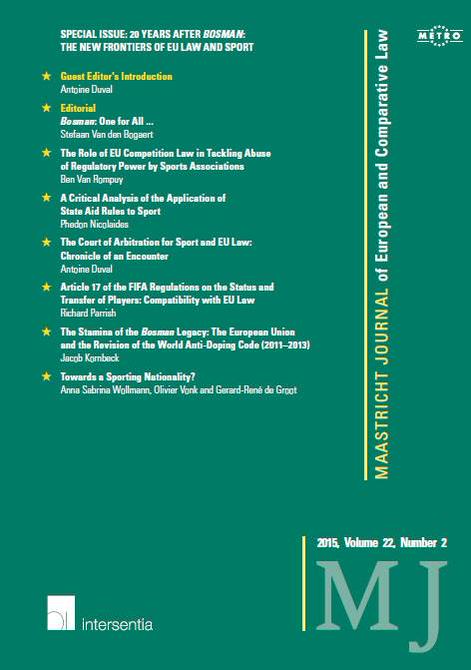Editor's note: This is a short introduction written for the special Issue of the Maastricht Journal of European and Comparative Law celebrating the 20 years of the Bosman ruling and dedicated to the new frontiers of EU law and Sport (the articles are available here). For those willing to gain a deeper insight into the content of the Issue we organize (in collaboration with Maastricht University and the Maastricht Journal) a launching event with many of the authors in Brussels tomorrow (More info here).

20 Years After Bosman - The New Frontiers of EU Law and Sport
By Antoine Duval
The Bosman
ruling is not just another ruling of the Court of Justice of the EU (CJEU), it
is by far the most well-known decision of the Court outside of the Euro-bubble.[1]
In the UK the phrase ‘a Bosman’ is commonly used to qualify the free move of a
football player to a new club at the end of his contract. Beyond its anchoring
in the English idiom, Bosman stands
out as a shared European reference. However, it is often – misleadingly - credited
for all the ills and wrongs of football. In any case, it is part and parcel of
the European (even worldwide) public debate on football and its regulation. If
a European public sphere is to emerge at some point, the heated public
discussion that was triggered in Europe by Bosman
is probably an avant-goût of it.
Therefore, 20 years after the ruling, the least a European sports lawyer and
academic can do, is to acknowledge ones indebtedness and, to some extent,
gratitude for this ruling.
One aspect that needs to be emphasized is that Bosman is not an instrument with the
paramount objective to deregulate the football market or the world of sport in
general. It is not, as many on the side of the Sports Governing Bodies (SGBs),
and FIFA and UEFA in particular, have portrayed it, a decision aimed at
destroying the transnational legal system (also known as lex sportiva) they had put in place to coordinate the organization
and unfolding of transnational sporting competitions. On the contrary, SGBs have
the possibility to justify their rules and regulations. As Stephen Weatherill rightly
pointed out long ago, the only requirement SGBs have to fulfil to ensure that
their regulations comply with EU law is to explain convincingly why they are
needed.[2]
Thus, a constructive (and positive) perspective on Bosman stresses its constitutional over its deregulatory function.
Private regulations adopted by private powers, which are not particularly renowned
for the quality of their governance, need to be subject to checks and balances.
After Bosman, the EU free movement
rights and competition law have impersonated such a check on (or counter-power
to) the rules privately adopted and enforced by SGBs. In fact, it is here that
the true, long-lasting legacy of Bosman
lies.
This issue brings together a mixed line-up of both
young and established scholars, sports law experts and EU law specialists, to
discuss the legacy of Bosman and the
future of the relationship between EU law and sport. Besides the synthetic and comprehensive
introductory piece of Stefaan Van Den Bogaert that brings us back to the
original crusade of Mr Bosman, all the contributions are geared towards the
recent and future legacies of the ruling. A broad range of legal problems
raised by the interaction of EU law and sport is touched upon.
In the first article, Ben Van Rompuy builds on
Advocate General Lenz’s conclusions in Bosman,
the following practice adopted by the EU Commission as well as on the case law
of the CJEU on competition law and sport to argue that competition law can be a
powerful tool to impose a legal check on the regulatory practices of SGBs.
In the second piece, Phedon Nicolaides analyses a
relatively new front line between EU law and sport: state aid. Although not
directly connected to Bosman, state
aid cases are taking a prominent place in the practice of the EU Commission in
the field of sport. In fact, state aid law has become a useful legal proxy to
control the way public authorities decide to support economically sporting
organizations and their events.
The third piece by the editor of this issue is
dedicated to the interaction between the Court of Arbitration for Sport (CAS)
and EU law. Indeed, the emergence of the CAS is probably the most important
institutional legacy of Bosman, and
EU law now has a role to play in exercising a form of ‘Solange’ control over CAS’s judicial activity.
In the fourth article, which follows most clearly into
the footpath of Bosman, Richard
Parrish discusses the compatibility of the FIFA Regulations on the Status and
Transfers of Players (RSTP) with EU law. He suggests that the RSTP as it stands
can be deemed contrary to EU law.
The fifth article of the issue by Jacob Kornbeck, a
former member of the sports unit of the European Commission, analyses the role
of the Commission in the drafting process of the new World Anti-Doping Code
recently adopted by the World Anti-Doping Agency. He highlights that the ethos
of Bosman spread to other spheres of
action of the EU in sport and shows concretely in what way it influenced the
position of the EU in the negotiations over the new Code that entered into
force in January 2015. Finally, Anna Sabrina Wollmann, Olivier Vonk and
Gerard-René de Groot look at the growing problem of nationality requirements in
sports. If Bosman stands more
particularly for an Europeanization of football, globalization and the ease of
cross-border movement for professional sportspeople have heightened the
question of the sporting nationality of athletes worldwide. This contribution
critically analyses the many calls for a separate sporting nationality and
proposes an alternative path.